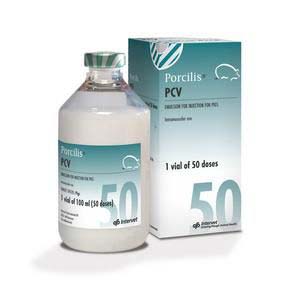 Intervet/Schering-Plough Animal Health announces today that a field trial with the single-dose subunit vaccine PORCILIS® PCV has confirmed that vaccination induces humoral and cellular immunity and protects piglets against the consequences of porcine circovirus-associated disease (PCVD).
Intervet/Schering-Plough Animal Health announces today that a field trial with the single-dose subunit vaccine PORCILIS® PCV has confirmed that vaccination induces humoral and cellular immunity and protects piglets against the consequences of porcine circovirus-associated disease (PCVD). A randomized, double-blind study in 818 piglets that is published in Veterinary Microbiology* this month has shown that after vaccination with PORCILIS PCV at three weeks of age, there was a beneficial effect on mortality rate with a 50 percent reduction as compared to a control group receiving placebo vaccine. PCVD-associated morbidity was also reduced in vaccinated piglets, resulting in a 30 percent lower need for antibiotics treatment. Moreover, vaccination resulted in an improvement of average daily weight gain of 70 g/day during the finishing phase and a 4.5 kg gain of carcass weight at slaughter.
The study results also indicate that vaccination induces humoral immunity (measured by formation of virus-neutralizing antibodies) as well as a specific cell-mediated immunity (measured by an increase of interferon-γ secreting cells). Dr. Alex Eggen, Global Technical Director Swine at Intervet/Schering-Plough Animal Health, explains the relevance of this finding: “The induction of cell-mediated immunity two weeks after vaccination confirms previous laboratory results that for full protection against PCV2 infection, a combination of humoral and cell-mediated immunity may be necessary for optimal reduction of viremia.”
Dr. Eggen also stresses the fact that antibodies act as a first line of defence and that these antibodies make it impossible for the PCV2 virus to enter a cell. He said: “As virusses only multiply inside cells this is an important finding. The minimal induction of a cellular immunity response as seen in the vaccinated pigs after undergoing the field challenge is a clear signal that only few viral particles entered the cells due to the neutralization by antibodies. This means little stimulation of the cellular component and is a signal for optimal protection.”
 Major characteristics of PORCILIS PCV are that: (1) it contains the Cap-2 subunit antigen coded by the ORF2 gene and therefore induces strong immunity against PCV2 infection; (2) it is combined with XSolve, an adjuvant offering immunity until the end of the finishing period; and (3) is able to break through all levels of maternally-derived antibodies in piglets depending on the vaccination schedule used. Infection with PCV2 is known to cause a variety of syndromes in pigs, together known as Porcine Circo Virus Disease (PCVD). Symptoms may include clinical signs such as weight loss or failure to grow, enlarged lymph nodes, difficulty in breathing, pale skin and jaundice. PCVD is causing major economic losses to pig farmers all over the world.
Major characteristics of PORCILIS PCV are that: (1) it contains the Cap-2 subunit antigen coded by the ORF2 gene and therefore induces strong immunity against PCV2 infection; (2) it is combined with XSolve, an adjuvant offering immunity until the end of the finishing period; and (3) is able to break through all levels of maternally-derived antibodies in piglets depending on the vaccination schedule used. Infection with PCV2 is known to cause a variety of syndromes in pigs, together known as Porcine Circo Virus Disease (PCVD). Symptoms may include clinical signs such as weight loss or failure to grow, enlarged lymph nodes, difficulty in breathing, pale skin and jaundice. PCVD is causing major economic losses to pig farmers all over the world.Intervet/Schering-Plough Animal Health



